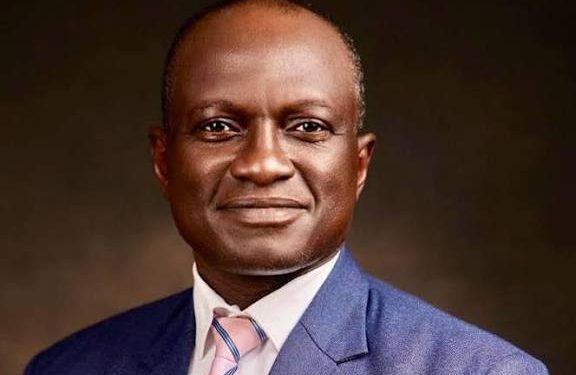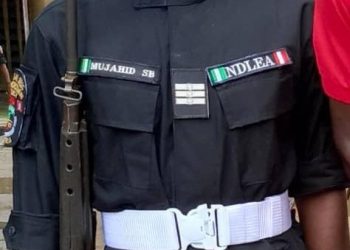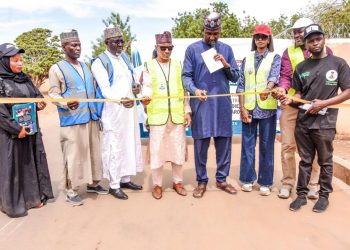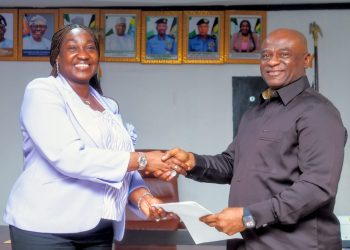By Nkechi Eze
The National Coordinator of the National Counter Terrorism Centre (NCTC), Office of the National Security Adviser (ONSA), Major General Adamu Garba Laka, has called for a renewed culture of credibility, transparency, and collaboration between government spokespersons and the media as a means of countering misinformation and strengthening national security in the digital age.
Represented by the Head of Strategic Communication, NCTC–ONSA, Mr. Abu Michael, Major General Laka made the call while delivering the keynote address as Special Guest of Honour at the opening ceremony of the 2025 Press Week of the Federal Information Chapel of the Nigeria Union of Journalists (NUJ), held on Thursday, October 23, 2025, at the National Press Centre, Radio House, Abuja.
Speaking on the theme, “Media, Public Relations and Governance: Repositioning Government Spokespersons for Credibility in the Digital Era,” Major General Laka described it as both timely and crucial in view of the transformative shifts currently reshaping global and national communication spaces. He noted that while the digital revolution has democratized access to information, it has also amplified the speed at which misinformation and disinformation spread, posing serious threats to governance, national unity, and public confidence.
According to him, credibility has become the most valuable asset in public communication and should be treated as the lifeblood of government engagement. “Credibility is no longer a luxury; it is the very currency of public engagement,” he stated. “In an age where the first narrative often becomes the accepted truth, government spokespersons must evolve into proactive, transparent, and trusted communicators who can engage both the traditional media and the dynamic digital audience.”
The NCTC boss, who spoke from the perspective of national security, underscored the growing link between information and security, explaining that violent extremism and terrorism thrive not only on ideology and weapons but also on narratives that shape perception and mobilize support. “Violent extremism and insurgency thrive not only on weapons and ideologies, but also on narratives. In many cases, it is the narrative that precedes the violence,” he said. “This is why strategic communication must be central to our counter-terrorism efforts. It is not enough to degrade hostile actors on the battlefield; we must also win the information war, a battle fought through facts, trust, engagement, and the consistent delivery of credible information.”
Major General Laka emphasized that government spokespersons serve as the frontline defenders in this information warfare, shaping public perception, building confidence, and countering harmful propaganda. However, he noted that being effective in this role requires not only communication skills but also authenticity and integrity. “Government spokespersons are our frontline defenders in this space. Their voices shape perception, build confidence, and counter harmful propaganda. But to be effective, they must not only speak, they must be believed,” he stressed.
He further explained that for government spokespersons to be repositioned effectively in the digital era, they must be equipped with modern tools for digital engagement, crisis communication, and media relations. He added that timely and transparent information dissemination was crucial in building trust and preventing speculation, as public silence or delay often creates room for misinformation. Major General Laka also called for stronger collaboration between security institutions and the media, describing the relationship as one of mutual dependence in which journalists require access to accurate information, while security agencies rely on the media to educate and unify the public.
While urging government officials to communicate with clarity, he also appealed to journalists to uphold the ethics of their profession. “Credibility is a two-way street,” he said. “While we ask for responsible communication from government officials, we also urge our media professionals to continue upholding the ethics of truth, balance, and objectivity.”
The National Coordinator pointed out that the modern spokesperson is no longer just a messenger of government policy, but a bridge builder, a guardian of public trust, and a strategic actor in nation-building. He urged participants at the event to use the Press Week as a platform for reflection and renewed collaboration between the media and government institutions, noting that both play indispensable roles in advancing democracy and good governance.
“Let us commit to stronger partnerships between government and the media,” he said. “A credible voice remains the most powerful tool of governance in the 21st century.”
Major General Laka reaffirmed that the Office of the National Security Adviser remains fully committed to open communication, constructive engagement with the media, and a strategic public information framework that supports peace, unity, and collective security.
The event, which attracted top government officials, communication experts, and media executives, highlighted the centrality of credible information management in governance and the shared responsibility of both government spokespersons and journalists in preserving public trust and national stability.
















